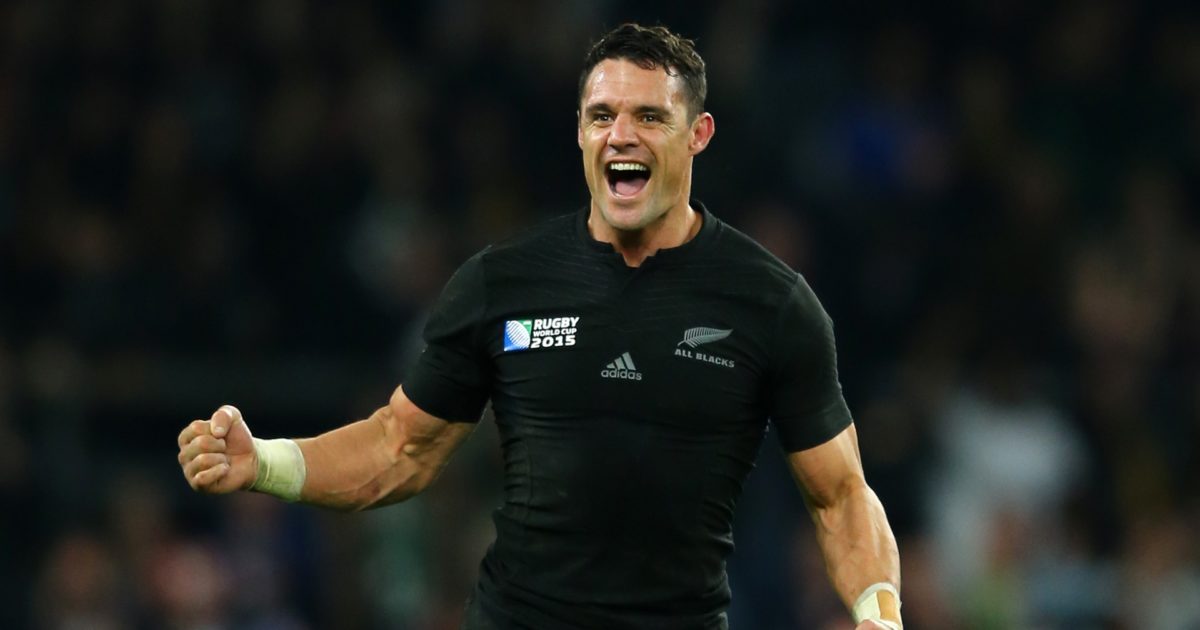Dan Carter reveals the key to success for All Blacks at next year's World Cup

All Blacks legend Dan Carter has offered some insight as to how New Zealand can win next year’s World Cup in France, drawing comparisons between the current national squad and the team that rose from the ashes of the 2007 World Cup.
Carter was a key member of the All Blacks squad that suffered their worst-ever showing in World Cup history when they were famously bundled out at the quarter-final stage of the 2007 event by France in one of the tournament’s biggest upset results.
In the years after that defeat, the All Blacks took an introspective look at themselves to identify and address their shortcomings from that World Cup to avoid a repeat of such a disaster in future tournaments.
What they found was that, as perennial World Cup favourites, they were ill-equipped to deal with pressure, and subsequently crumbled under the weight of expectation when faced with adversity from Les Bleus in Cardiff 15 years ago.
As such, Carter and his All Blacks teammates spent plenty of time working with mental skills specialists in order to improve themselves in the lead-up to the 2011 World Cup in New Zealand.
The result was a first World Cup victory in 24 years as the All Blacks won the Webb Ellis Cup against France on home soil, before following it up with an historic second successive title in England four years later.
Speaking on the Aotearoa Rugby Pod, Carter said the lessons he and his All Blacks teammates learned about coping with pressure and adversity were critical in their title-winning exploits at the 2011 and 2015 World Cups.
“A lot of the work and success that we had in 2011 and 2015 was off the back of the learnings that we got in 2007,” Carter told the Aotearoa Rugby Pod.
“We learned that we needed to spend a lot more time on our mental strength, the mental side of the game, because we weren’t able to handle pressure. There was a lot of talk about the All Blacks being chokers come World Cup time.
“As soon as we got put under pressure, we didn’t perform, so we spent a lot of work with [mental skills coaches] Ceri Evans, Gilbert Enoka, working on our mental strength and actually walking towards pressure.
“That really helped us, even though we had a blip in 2009 when the Springboks absolutely dominated us in three test matches, but we managed to turn things around in 2010 and 2011.”
After having retired from international rugby following the 2015 World Cup, Carter has maintained a high level of interest in the All Blacks as a spectator from afar.
Like most New Zealanders, the former 112-test first-five, who retired from all rugby early last year, watched on as the All Blacks crashed out of the 2019 World Cup in Japan, falling to a 19-7 semi-final defeat at the hands of England.
Unlike most Kiwis, though, Carter views that defeat as a positive for New Zealand’s chances ahead of next year’s World Cup in France.
Carter told the Aotearoa Rugby Pod that he sees similarities between the current group of All Blacks and the team that developed after the 2007 World Cup as there are members of Ian Foster’s squad who have now experienced failure at rugby’s highest level.
No member of Sir Steve Hansen’s 2019 squad had gone through the heartbreak of falling short at World Cup before, but Carter said that will be different next year when those who featured at the 2019 World Cup return to Foster’s squad in 2023.
Carter told the Aotearoa Rugby Pod that those players, especially the senior leaders, will be hurt by that defeat, as were the experienced heads from the 2007 World Cup who went on to redeem themselves in 2011 and 2015.
Carter sees that as beneficial for the current crop of All Blacks, provided they channel those emotions into lessons about how to overcome their shortcomings from three years ago.
“I shouldn’t be saying this, but what I like is, in 2019, that would have really hurt a lot of the [All Blacks], in particular the experienced [All Blacks],” Carter told the Aotearoa Rugby Pod.
“2019 would have really hurt. In 2015 and 2011, there were players in that World Cup squad that knew what it was like to lose at a Rugby World Cup, so there was still a lot of hurt, a lot of learnings from those experiences.
“You got to 2019, there was no one in the squad that had been part of a losing World Cup squad. They’d only had success, with the likes of the 2011 and 2015.
“For 2023, there are going to be players there that were there in 2019 that have that hurt, that have that drive, that have that desperation, so I see it as a positive.
“I know I probably shouldn’t, that we didn’t win that last one, but as long as they use those learnings and the experience and that drive, that hurt that they went through in Japan, then it can be really beneficial for them.”












































Doesn’t matter how they feel or what mental strength they acquire if they don’t have a coach that can direct or select
Beat England?